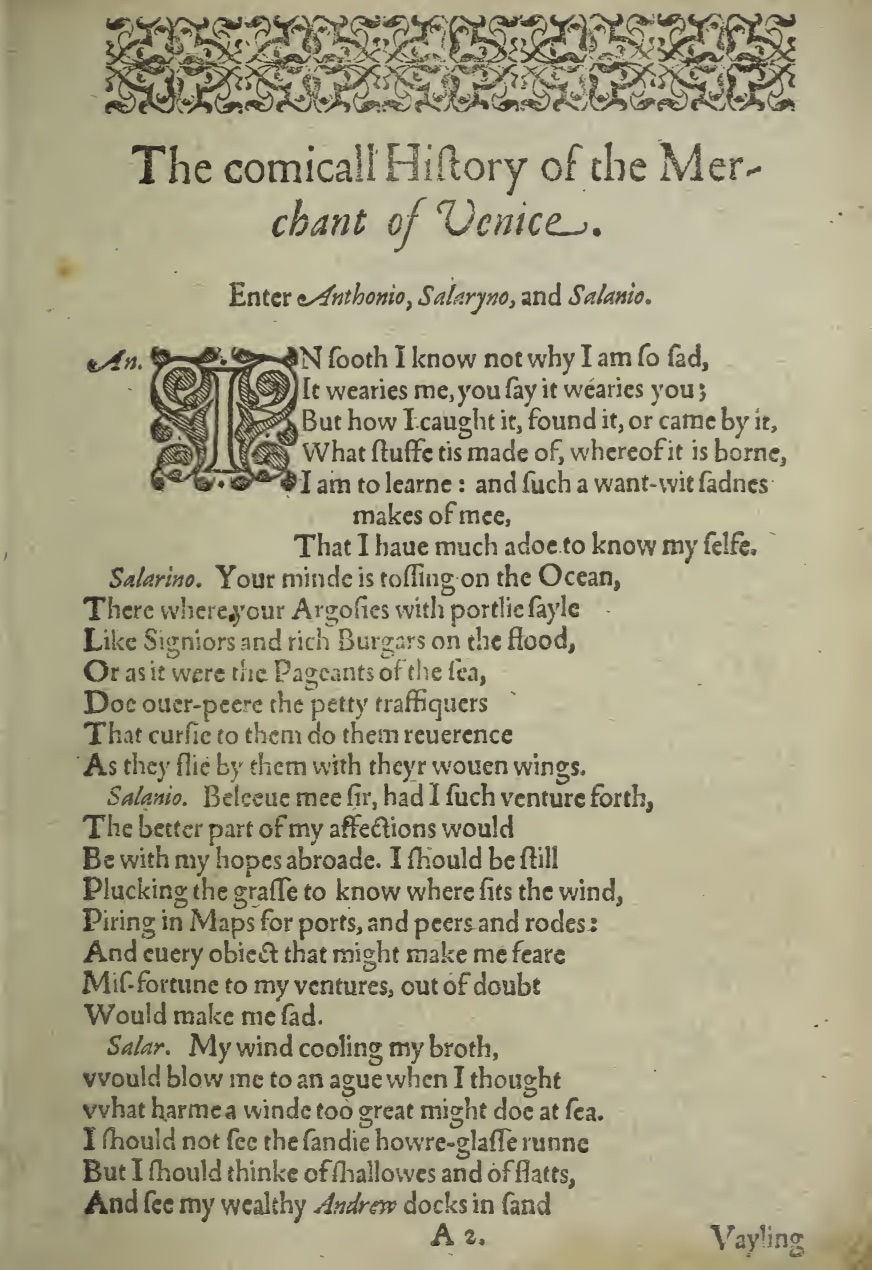- In the original edition, 'I' is set aside from the rest of the line, embellished with what appears to be ivy branches. The branches point upwards, appearing as if the 'I' is flexing its arms. Perhaps, Shakespeare chose to highlight the letter 'I' as a way to emphasize the internal; foreshadowing Antonio's discussion of the self. We were unable to insert an image of the original 'I.' Instead, we opted to bold and color it royal blue as a way to emphasize its original muscular and/or strong connotations, as well as its reference to the internal self.
- Truth. "sooth, n." OED Online, Oxford University Press, March 2020, www.oed.com/view/Entry/184702. Accessed 29 March 2020. All subsequent definitions come from the OED, unless otherwise noted.
- A person who lacks common sense. Here, Anthonio suggests that his sadness results in a lack of knowledge. Anthonio's lack of knowledge is further emphasized in the lines "I am to learn" and "I have much ado to know myself" - both suggesting that he is not properly informed about his own sadness (e.g., where it derives from, how he caught it, etc). In describing himself as as a 'want-wit,' Anthonio may also be foreshadowing his decision to trade a pound of flesh with Shylock, i.e., his sadness results in both a lack of knowledge and, consequently, an inability to make sensible decisions.
- Here, Salaryno suggests that Anthonio's mind is being thrown on the ocean with his ships. While his ships can easily survive the waves, we see through his sadness that his mind cannot. This reference to the ocean and the water imagery that follows can be a metaphor for not only the water and/or flood of Anthonio's tears, but also the trials and storms of the world around him that have brought him to such immense sadness.
- A large merchant-vessel, noted mainly in the regions of Ragusa and Venice
- Bearing dignity. Here, Salaryno is attempting to reassure Anthonio that his ships will return by emphasizing their grandeur and prestige. If we consider the ocean to be a a metaphor for Anthonio's sadness, then the argosies are a metaphor for Anthonio himself. As such, Salaryno is suggesting that Anthonio will overcome his saddness because he is larger and more dignified than the emotion.
- A title of courtesy for an Italian man. Here, Salaryno is again suggesting that Anthonio's ships possess a certain of level of prestige, comparable to people that go by "Sir." As such, Anthonio is also more prestigous than the ocean (i.e., his sadness) and can override it due to his prestige.
- An inhabitant of a borough. Similar to 'signors,' Salaryno describes the burghers as 'rich' to emphasize both the prestige of Anthonio's ships and the power of Anthonio to overcome his depressive emotions.
- Here, Salaryno is possibly referring to The Great Flood; suggesting that Anthonio's boats are so powerful that they could withstand the test of a biblical weathering. This 'flood' reference could also be emphasizing the granedur and/or expansiveness of Anthonio's sadness.
- An allegorical device erected on a stage or float, used as part of a public celebration (i.e., a parade float). Here, Salaryno suggests that Anthonio's sadness is impermanent, i.e., it will pass or 'float by' when his ships return.
- 'Over-peer' has two meanings; either to tower over or to have a higher position than. The former definition suggests that Anthonio's ships are bigger than other ships, the latter definition suggests that his ships are of higher rank than other ships. Both definitions can be interpreted to suggest that Anthonio is above/has authority over his sadness.
- 'Ague' has a double meaning; either a state of distress or a fit of shivering. The latter definition suggests that Salaryno is using the ocean metaphor literally, i.e., he is shivering due to the high winds. The former definition suggests that Salaryno is thrown into a state of emotional distress when he blows on his soup, as it reminds him of how strong winds have the ability to wipe out ships. This coincides with Salaryno's earlier understandings of Anthonio's sadness; suggesting that Anthonio's emotional state is tied directly to the stability of his ships.
- Reference to HMS St. Andrew, a Spanish galleon captured by the English in the 1596 Capture of Cádiz. Again, this is likely Salaryno's way of comparing Anthonio's ships to large, prestigious vesicles and, consequently, his propensity to overcome sadness. Mabillard, Amanda. The Merchant of Venice Q & A. Shakespeare Online. 20 Aug. 2000. http://www.shakespeare-online.com/faq/merchantfaq.html. Accessed 29 March 2020.
